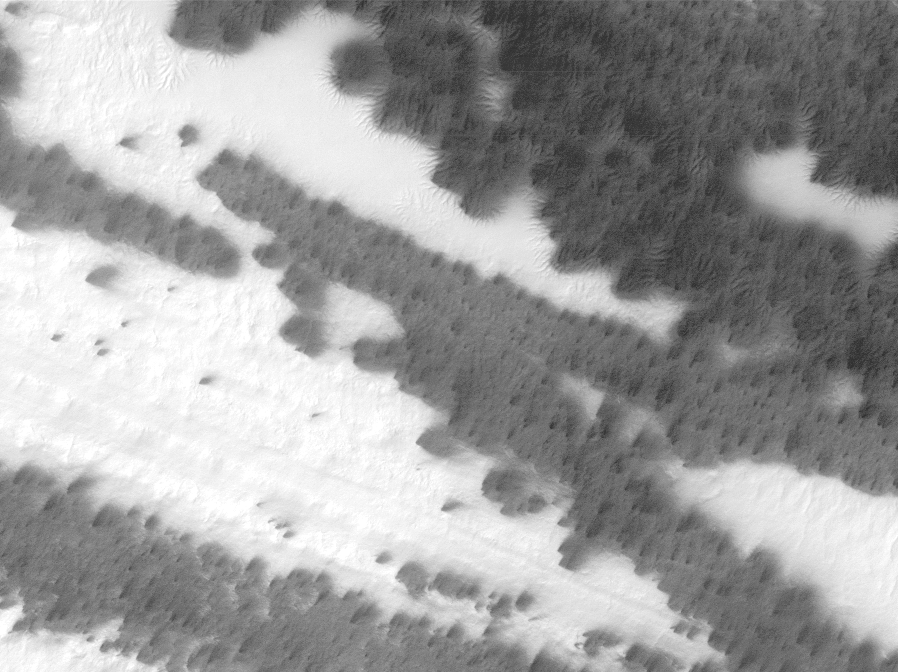 They used a computer model to simulate vegetation reflectance at different planetary phase angles and added both simulated and real cloud cover to calculate the planetary albedo for a vegetated and non-vegetated planet with abundant liquid water.
They used a computer model to simulate vegetation reflectance at different planetary phase angles and added both simulated and real cloud cover to calculate the planetary albedo for a vegetated and non-vegetated planet with abundant liquid water. Posted on 12/13/2010 8:51:20 AM PST by LibWhacker
Forests might be detectable on extrasolar planetsThanks to a new remote sensing technique, astronomers may soon be able to detect the presence of multicellular life (like trees) on planets outside of the Solar System.
Excitingly, we've been able to detect the composition of atmospheres on a handful of planets orbiting other stars. But if next-generation space observatories go online within the next couple of decades, some scientists propose using a new technique to determine details such as tree-like multicellular life on extrasolar planets.
While previous studies have discussed the likelihood of detecting life on exoplanets through signs of biogenic gases in the atmosphere, or seeing "glints" of light off oceans or lakes, those technique are limited in that, for example, biogenic gases could be signs of either single-celled or multicellular life – not providing much detail - and as we've seen from Titan, glints off planetary bodies do not necessarily come from water-filled lakes.
Researchers Christopher Doughty and Adam Wolf from the Carnegie Institution propose using a technique that Earth-orbiting satellites already use to in order to determine types of crops and land cover, as well as cloud detection, atmospheric conditions and other applications.
Called Bidirectional Reflectance Distribution Function (BRDF), this type of remote sensing determines the causes of differing reflectance at different sun- and view-angles. For example, trees cast shadows on the planet, and the large-scale pattern of shadows would make the light reflected off the vegetation to take on specific brightness and color characteristics.
"BRDF arises from the changing visibility of the shadows cast by objects," the researchers wrote in their paper, "and the presence of tree-like structures is clearly distinguishable from flat ground with the same reflectance spectrum. We examined whether the BRDF could detect the existence of tree-like structures on an extrasolar planet by using changes in planetary albedo as a planet orbits its star."
 They used a computer model to simulate vegetation reflectance at different planetary phase angles and added both simulated and real cloud cover to calculate the planetary albedo for a vegetated and non-vegetated planet with abundant liquid water.
They used a computer model to simulate vegetation reflectance at different planetary phase angles and added both simulated and real cloud cover to calculate the planetary albedo for a vegetated and non-vegetated planet with abundant liquid water.
Depending on how accurately planetary cloud cover can be resolved, as well as the sensitivity instruments on proposed missions such as the Terrestrial Planet Finder, this technique could theoretically detect tree-like multicellular life on exoplanets in about 50 nearby stellar systems.
The angles of the spacecraft, the planet and its sun would have to be taken into account but the team says these characteristics would change in predictable ways over time, producing a detectable pattern.
If vegetation on the exoplanet was wide¬spread enough, it would affect the reflective properties of the whole planet.
"We found that even if the entire planetary albedo were rendered to a single pixel, the rate of increase of albedo as a planet approaches full illumination would be comparatively greater on a vegetated planet than on a non-vegetated planet," they said.
Who knows.... heck they get lots of money for socialism..
And we all know what a scam that is..
I hope there are no Ewoks on these forested planets.
Wookies are OK.
At the rate our imaging technology is progressing I suspect we’ll be seeing our first fuzzy pictures of the nearer exoplanets within a decade. In another 10 or 20 years pictures approching Hubbel quality mars images.
I believe the nearest discovered planet is a hot jupiter planet arounf 10 light years away.

.........I know there’s a pony in here somewhere ..............!!!!!!!!!!!!
Hey we could’ve been there yesterday if we ever (in the future) manage to go faster than the speed of light...


Yup.
The ones in your first photo look EXACTLY like the douglas firs I have in my backyard in the Google satellite images.

"Did someone mention 'forests'?"
I notice when you copy the URL to a blank page, and then regress towards the home page, one “/” at a time, you are immediately redirected to the FBI’s home page.
I’m not kidding you!
CA....
 |
||
| · join · view topics · view or post blog · bookmark · post new topic · subscribe · | ||
| Google news searches: exoplanet · exosolar · extrasolar · | ||
Disclaimer: Opinions posted on Free Republic are those of the individual posters and do not necessarily represent the opinion of Free Republic or its management. All materials posted herein are protected by copyright law and the exemption for fair use of copyrighted works.